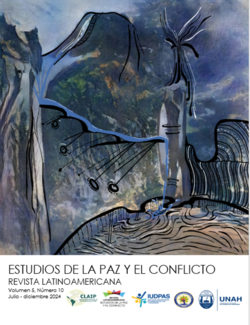Peripheries in the pandemic: a human (in)security perspective
DOI:
https://doi.org/10.5377/rlpc.v5i10.17554Keywords:
Covid-19 pandemic, human security, brazilian peripheriesAbstract
This work analyzes the experience of different peripheral populations during the Covid-19 pandemic based on their testimonies. Our analysis starts from a critical perspective on human (in)security in Brazil, which affects vulnerable groups and leads to different pandemic effects, reinforcing problems of a structural dimension that precede the pandemic. Based on the thematic analysis of 40 testimonies, we identify which dimensions of human (in)security are preponderant and how they relate not only to each other, but also to structural and historical features of the Brazilian society. The testimonies analyzed include texts, audios and videos submitted to the repository of the Periferias na Pandemia project, developed through a partnership between the Center for Conflict and Peace Studies (NUPRI/USP) and the Perseu Abramo Foundation. They were received between April 2022 and April 2023 from localities in 21 federative units and deal not only with the personal experiences of these individuals, but also with the responses and absences of the state in their communities, in addition to social mobilization processes that responded to the challenges arising from the pandemic. Our argument is that a peripheral view of human security in Brazil during this pandemic period can contribute to envisage more effective measures to reduce damage in emergency situations - such as epidemics or natural catastrophes - and to the formulation of political agendas more aligned with the plurality of Brazilian peripheries.
Downloads
337
HTML (Português (Brasil)) 37
XML (Português (Brasil)) 22
EPUB (Português (Brasil)) 68
Downloads
Published
How to Cite
Issue
Section
License
Copyright (c) 2024 Latin American Journal of Peace and Conflict Studies

This work is licensed under a Creative Commons Attribution 4.0 International License.
The journal's contents are published under a Creative Commons Attribution 4.0 license (CC BY 4.0). This license allows third parties to share (copy and redistribute the material in any medium or format) and adapt (remix, transform and create from the material for any purpose, including commercial), as long as the authorship and first publication in this journal (Revista Latinoamericana Estudios de la Paz y el Conflicto, Universidad Nacional Autónoma de Honduras - Consejo Latinoamericano de Investigación para la Paz, DOI of the work) is acknowledged, a link to the license is provided and it is indicated if changes have been made to the original. The terms of the license are available online at http://creativecommons.org.




